ROUNDTABLE DISCUSSION ON EXAMINING THE RBIO FROM PERSPECTIVES IN INTERNATIONAL LAW
Monograph on the Roundtable Discussion on “Examining the Rules-Based International Order (RBIO) from Perspectives in International Law"
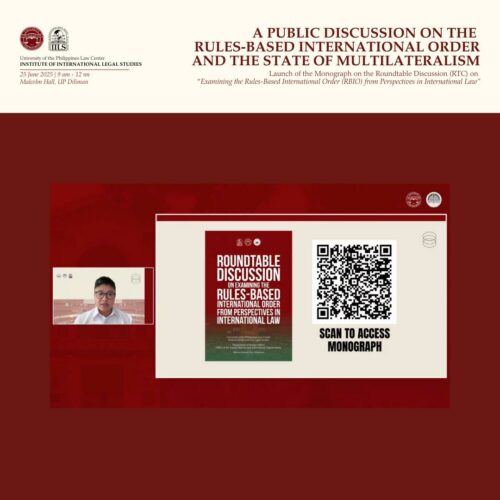
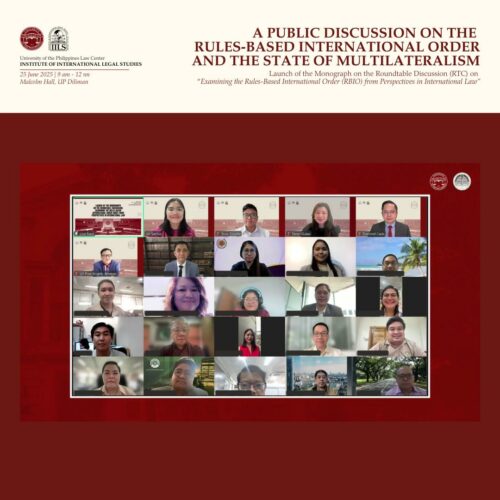
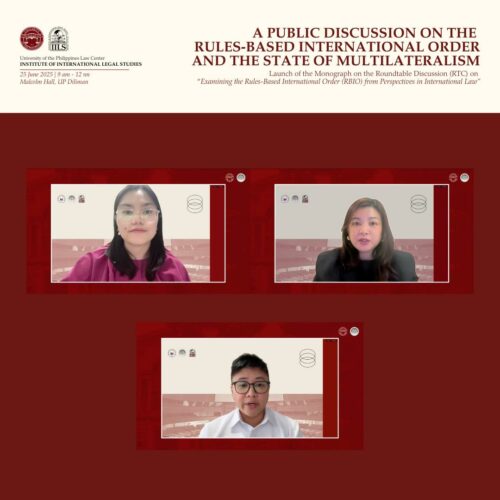
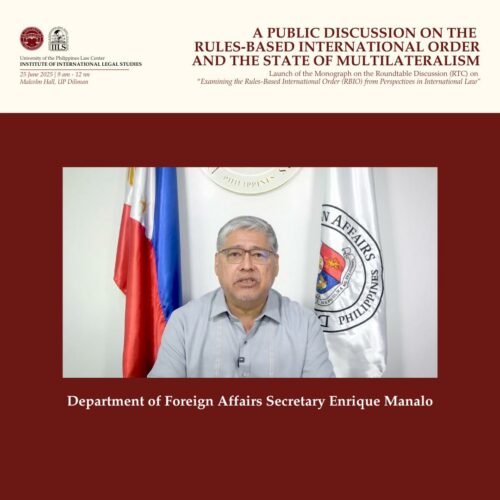
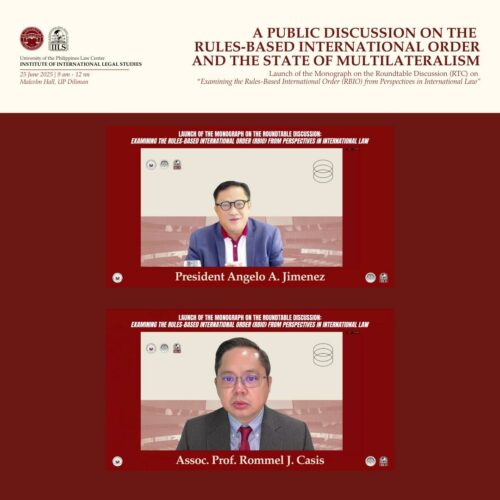
Launch of the Monograph on the Roundtable Discussion on Examining the Rules-Based International Order (RBIO) from Perspectives in International Law
On June 25, 2025, the Institute of International Legal Studies of the University of the Philippines (UP) Law Center hosted the virtual launch of the Monograph on the Roundtable Discussion on Examining the Rules-Based International Order (RBIO) From the Perspectives in International Law. The event was initiated with the opening remarks of UP President Angelo Jimenez, who delivered a message regarding the significance of the Monograph on discourse regarding contemporary issues facing the international order. This was followed by remarks given by the Department of Foreign Affairs (DFA) Secretary Enrique Manalo, the actual launch of the Monograph by Atty. Ross Tugade, insights by Associate Professor Rommel Casis, and finally, the closing remarks by Atty. Niner Guiao. The launch of the Monograph reaffirmed the University’s commitment to Honor, Excellence, and Service by disseminating the exchange of invaluable ideas to the public and facilitating discussion on the issues faced in the international order. The launch of the Monograph is timely and essential as challenges in maintaining peace and order plague the world. It also marked an important milestone in the partnership between the University’s Institute of International Legal Studies and the Department of Foreign Affairs, paving the way for succeeding joint endeavors between the two institutions.
The Monograph commemorates the roundtable discussion (RTD) held on August 27, 2024, which served as a platform for international law experts and practitioners of international relations to explore the concept of a “rules-based international order” candidly. The discussions, following the Chatham House Rule, were compiled into a monograph.
The launch event of this monograph on June 25, 2025 was opened by UP President Angelo Jimenez, who also gave the opening remarks in the RTD event. President Jimenez lauded the UP College of Law and the Institute of International Legal Studies for their efforts in making public the enlightening exchange of ideas in the Roundtable Discussion through the launch of the Monograph. He also talked about the significance of academic discussions in the context of the challenges faced by the rules-based international order, manifesting his hope that launching the monograph would encourage further engaged and critical discourse.
Department of Foreign Affairs Secretary Enrique Manalo also gave his remarks via a pre-recorded message to commemorate the launch. Secretary Manalo recalled the challenges that were addressed in the Roundtable Discussion, emphasizing that diplomacy is not removed from international legal discourse, but is integral to it. He also reiterated concerns about the quiet erosion of the international order precipitated by the erosion of faith in international law and international institutions. He called upon the legal community to be at the frontier of legal development, ensuring that power is mediated by law. Given these challenges, Secretary Manalo gave a call to action to contribute to the development and even the reinvention of international law. To end his remarks, the Secretary manifested his hope for further partnerships with the University of the Philippines in a conversation on legacies and advocacies of the Philippines in the United Nations.
To formally launch the Monograph, Atty. Ross Tugade recalled the purpose of the Roundtable Discussion, which was to have academics and practitioners from various disciplines give their insights on the rules-based international order. To the end that the discussions foster a free exchange of ideas, the discussions were designed to abide by the Chatham House Rule. Atty. Tugade also acknowledged the hard work of the team behind the monograph and proudly announced that the digital copy is finally available for download online, with a printed version to come soon.
Atty. Tugade also gave a few insights regarding the current state of the rules-based international order in the context of the recent violations of the prohibition on the use of force, stating that the post-World War II consensus to build international institutions is now in an existential crisis. Atty. Tugade gave particular attention to the problems posed by geopolitical power play and uneven levels of development among states and peoples, expressing concern over such issues that persist eighty years after the birth of the United Nations. Finally, Atty. Tugade emphasized that in Philippine state practice, the rules-based order is treated as a framework held together by international law. She recalls that this year marks the fiftieth year since the Bandung Conference, where the Third World Approaches to International Law (TWAIL) was born. She ends with a message that those outside the spiritual centers of International Law are also important in its formation and reimagination, hoping that the Monograph would be a step in facilitating such thoughts.
After Atty. Tugade’s remarks, Associate Professor Rommel Casis gave his insights as a member of the academe to Secretary Manalo’s remarks. Professor Casis called attention to the two definitions of the rules-based international order, one that describes it as a set of rules and one that describes it as a set of institutions that were established after the Second World War. The first definition is further divided into three points of view, one which views the international order as synonymous with international law, one which views it as a set of rules that overlap with international law but is broader in scope, and one which views it as an alternative to international law. He discerns the idea common to all of these views and definitions: the commitment of States to conduct themselves under predetermined rules, where States cannot wantonly do what they want in the name of national interest. Professor Casis lauds Secretary Manalos’s description of the rules-based international order—“one that is not sustained by the logic of power or the expediencies of politics but by the enduring authority of norms and institutions underpinned by international law,” echoing the need for the mutual employment of diplomacy and international law for the benefit of the global community. In this sense, Professor Casis sees the Roundtable Discussion as a step in the right direction, expressing his optimism for more collaborations between the Department of Foreign Affairs and the UP Law Center, through the Institute of International Legal Studies.
To end the program, Atty. Niner Guiao gave the closing remarks. In light of contemporary geopolitical events, she manifested that the present and future depend on upholding the integrity of institutions designed to uphold global peace and security. She expressed that the Monograph confirms the University’s commitment to Honor, Excellence and Service, announcing that more can be expected from the partnership between the University of the Philippines and the Department of Foreign Affairs, such as an upcoming project to explore impact of the perceived weakening of rules-based international order on global and regional cohesion and an event exploring the promotion of the rule of law and international law. The event was hosted by Atty. Jeli Santos.








































































































 on the upper right corner to select a video.
on the upper right corner to select a video.